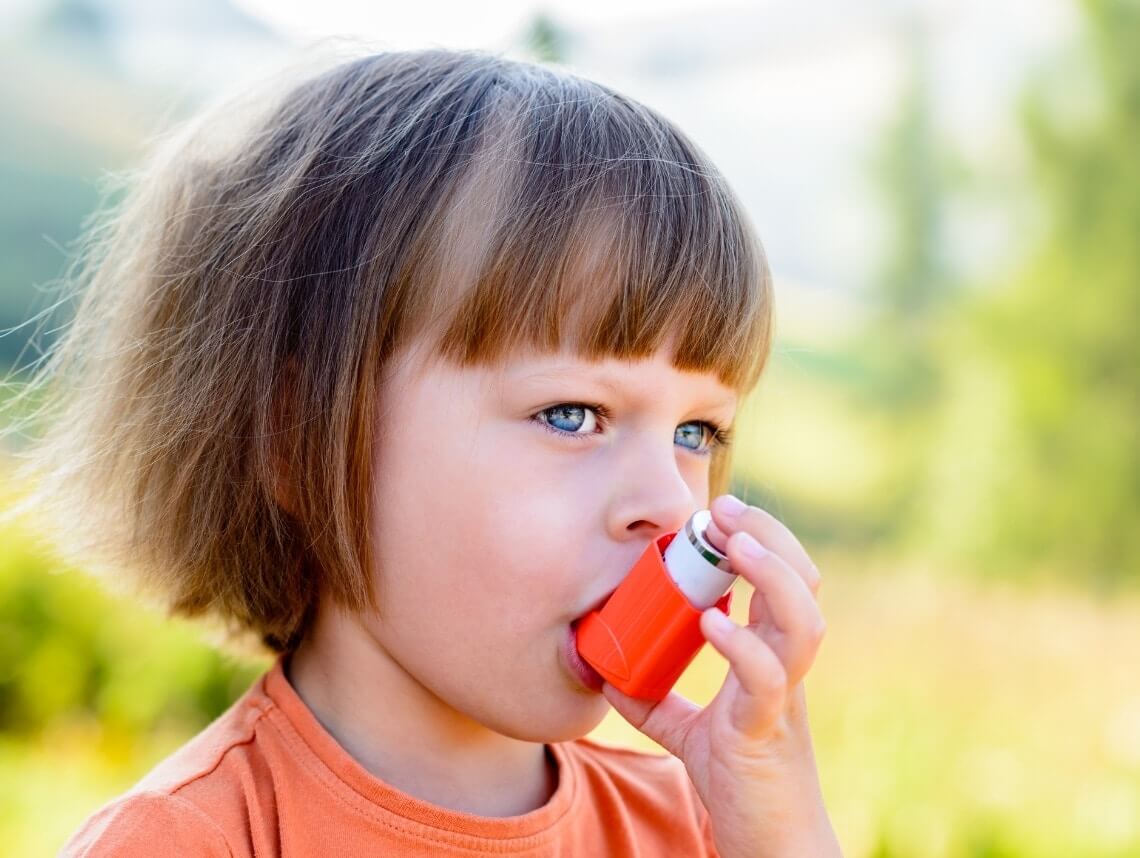
Being a parent is one of the most rewarding and scariest relationships a person could have. The love you feel for your child is all-encompassing and indescribable. If something affects their health, you feel like you’re the one who can’t breathe.
Feeling like you can’t get enough oxygen into your lungs is what it feels like to have an asthma attack. Since this condition is the most common chronic illness in children, we want to provide you with an overview of the condition and some insight into what to expect if your child has been diagnosed with asthma.
What is asthma?
Asthma is a disorder that causes airways to swell up, making it difficult for air to reach the lungs. When this happens it is called an asthma attack. If the attack is severe, not only is it difficult to breathe, but the decreased oxygen flow can also affect the function of internal organs. To make matters worse, the body creates additional mucus, making it even harder to breathe.
A person can be diagnosed at any age. Some people are diagnosed as children, others receive the diagnosis in adulthood.
The symptoms in adults and in children are the same. However, it’s one of the leading causes of hospitalization in children. If not properly managed, it can be life threatening. It has no cure, but with proper treatment, a child can have a normal life.
Risk Factors for an Asthma Attack
The biggest risk factor is allergies. If a person is prone to suffering from allergies, exposure to the source of irritation can trigger an asthma attack. Other risk factors include:
- Viral infections
- Genetics (if a family member has asthma, a child is more likely to have it)
- Mold
- Cigarette smoke
- Air pollution
- Feather bedding
- Sudden temperature changes
- Pet dander
- Stress
- Too much exercise
- Dust mites
- Cockroaches
Symptoms of Asthma in Children
Symptoms are many and can vary. However, the most common signs a child may be suffering from asthma are the following:
- Wheezing sound when the child breathes
- Chronic cough
- Shortness of breath
- Chest pains or tightness
- Increased mucus
- Difficulty sleeping
- Slow recovery from a common cold
- Widened nostrils when breathing
- Itching in the ears
Treatment for Asthma in Children
Treatment for asthma in children varies depending on the child’s age.
Children under 5 years of age
Diagnosing asthma in children who are younger than 5 years old is difficult, since the typical asthma symptoms could be the result of a different condition, and some children are not old enough to follow breathing instructions as directed by a doctor.
Your child’s pediatrician will likely order close monitoring of breathing patterns, as well as blood tests or X-rays. If your child is diagnosed with asthma, he or she may require medication.
As a parent, you will be instructed to keep detailed notes on how the medication affects your child: What triggered the asthma attack? How long did it last? Were there any side effects after taking medication? Did symptoms improve? How long did it take for the medication to take effect? Does the medication interrupt your child’s sleep patterns?
Children 5 and older
Your child’s pediatrician can test for asthma the same way adults are tested for the condition: By conducting a spirometry test or by measuring the child’s peak flow rate. If your child has asthma, the pediatrician will likely prescribe asthma medication (some of which may be administered through an inhaler) and refer you to an asthma specialist.
Another type of treatment for children who are 5 years of age and older is allergy shots. While they wouldn’t completely eliminate the risk of an asthma attack, they do build up a child’s resistance to triggers.
Complications of Asthma in Children
In addition to the stress caused by asthma, children may experience some of the following due to continued attacks:
- Constant fatigue
- Missing too many days from school
- Anxiety or depression
- Pneumonia
- Permanent narrowing of the bronchial tubes
Also, it’s crucial to note that when an attack is severe or if the patient does not respond well to medication, there can be more serious consequences, such as a collapsed lung or respiratory failure.
Preventing Asthma Attacks in Children
Besides making sure the child takes his or her asthma medication, parents can do the following to prevent asthma attacks in children:
- Vacuum the home often
- Change bed sheets regularly
- Keep the child inside as often as possible during allergy season
- Use an air purifier and AC air filters with HEPA filters
- Keep the child away from known triggers
- Get allergy shots if age appropriate
Contact Care Options for Kids For Pediatric Home Health Care
It can be hard to balance your time between work, home, and caring for a child. That’s why our team of skilled professionals at Care Options for Kids is here to help.
Our home health care services offer support in the comfort of your home. We refer loving and competent nurses to provide customized care for families — from a few hours a day to around-the-clock supervision. Contact us directly to speak with a home health care professional or request a free in-home assessment. Together we can determine the best plan of action to keep your loved ones happy and healthy.
If you are considering pediatric home health care services, contact the caring staff at Care Options for Kids. Call today at (888) 592-5855.
